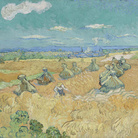to where the flowers are blooming

© gerdastudio | Gwangju Biennale Foundation installation view, Spazio Berlendis, Venezia
Dal 20 April 2022 al 27 November 2022
Venezia
Luogo: Spazio Berlendis
Indirizzo: Calle Berlendis, Cannaregio 6301
Orari: da martedì a domenica 10.00 – 18.00
Enti promotori:
- Gwangju Biennale Foundation
- Città di Gwangju
Costo del biglietto: ingresso gratuito
Sito ufficiale: http://gwangjubiennale.org
La Gwangju Biennale Foundation e la Città di Gwangju presentano a Venezia allo Spazio Berlendis dal 20 aprile al 27 novembre 2022 la mostra speciale "to where the flowers are blooming" in celebrazione del Movimento di Democratizzazione del 18 maggio (5.18 Democratization Movement).
Una celebrazione del Movimento di Democratizzazione 5.18, "to where the flowers are blooming" è iniziata a Seoul, in Corea nel maggio 2020 e ha girato Taipei, Colonia e Gwangju per commemorare il 40° anniversario del movimento e riflettere sulla storia e la contemporaneità dello spirito di Gwangju, città che ha guidato la democratizzazione della Corea. Dopo due anni di rinvio a causa della pandemia di Coronavirus, la mostra è finalmente arrivata a Venezia.
Riflettendo sull'umanità di oggi, la mostra presenta lo spirito di Gwangju attraverso il linguaggio artistico: il suo titolo è preso in prestito dalla frase "dove sbocciano i fiori" del capitolo conclusivo di "Atti Umani" (Adelphi, 2017) della scrittrice coreana Han Kang, che affronta il dramma vissuto nel maggio 1980 a Gwangju e si interroga su quali ricordi storici debbano essere trattenuti. La mostra esplora la volontà delle comunità di elevarsi al di sopra delle ferite ancora aperte e dei sentimenti di angoscia causati dalle tragedie che ricorrono nella nostra storia per procedere verso un mondo migliore.
Curata dal dipartimento espositivo della Gwangju Biennale Foundation, “to where the flowers are blooming” è formata da tre sezioni.
Una sezione di archivio curata da Yoo Kyoungnam, ricercatore presso il 5.18 Institute of Chonnam National University, che introduce l'eredità del Movimento di Democratizzazione 5.18 a Gwangju. La seconda sezione, composta da opere commissionate dalla Biennale di Gwangju, esamina la storia, le memorie, i traumi e il patrimonio spirituale della città attraverso i suoi siti storici e presenta opere prodotte a seguito di un'intensa ricerca sulla città e sul movimento di democratizzazione da Kader Attia ("Shifting Borders"), Ho Tzu Nyen ("The 49th Hexagram") e Bae Young-hwan ("Pop Song: March for the Beloved, ver.2"). La terza sezione, che riflette sul movimento di democratizzazione a Gwangju e sull'attivismo moderno, presenta opere di Hong Sung-dam ("May Print Series"), Noh Suntag ("Forgetting Machines"), Ahn Chang Hong ("Arirang Series" ), Choi Sun, Jin Meyerson (“The Politics of Memory”), Kim Chang-hun ("SHINE: Gwangju Soundscape"), Park Hwayeon, Suh Dasom.
In un momento in cui l'umanità sta affrontando sfide caratterizzate da sempre maggiore discriminazione e odio, la mostra “to where the flowers are blooming” servirà come un'opportunità per condividere i nostri pensieri e cercare prospettive future attraverso il linguaggio artistico e l'immaginazione.
Una celebrazione del Movimento di Democratizzazione 5.18, "to where the flowers are blooming" è iniziata a Seoul, in Corea nel maggio 2020 e ha girato Taipei, Colonia e Gwangju per commemorare il 40° anniversario del movimento e riflettere sulla storia e la contemporaneità dello spirito di Gwangju, città che ha guidato la democratizzazione della Corea. Dopo due anni di rinvio a causa della pandemia di Coronavirus, la mostra è finalmente arrivata a Venezia.
Riflettendo sull'umanità di oggi, la mostra presenta lo spirito di Gwangju attraverso il linguaggio artistico: il suo titolo è preso in prestito dalla frase "dove sbocciano i fiori" del capitolo conclusivo di "Atti Umani" (Adelphi, 2017) della scrittrice coreana Han Kang, che affronta il dramma vissuto nel maggio 1980 a Gwangju e si interroga su quali ricordi storici debbano essere trattenuti. La mostra esplora la volontà delle comunità di elevarsi al di sopra delle ferite ancora aperte e dei sentimenti di angoscia causati dalle tragedie che ricorrono nella nostra storia per procedere verso un mondo migliore.
Curata dal dipartimento espositivo della Gwangju Biennale Foundation, “to where the flowers are blooming” è formata da tre sezioni.
Una sezione di archivio curata da Yoo Kyoungnam, ricercatore presso il 5.18 Institute of Chonnam National University, che introduce l'eredità del Movimento di Democratizzazione 5.18 a Gwangju. La seconda sezione, composta da opere commissionate dalla Biennale di Gwangju, esamina la storia, le memorie, i traumi e il patrimonio spirituale della città attraverso i suoi siti storici e presenta opere prodotte a seguito di un'intensa ricerca sulla città e sul movimento di democratizzazione da Kader Attia ("Shifting Borders"), Ho Tzu Nyen ("The 49th Hexagram") e Bae Young-hwan ("Pop Song: March for the Beloved, ver.2"). La terza sezione, che riflette sul movimento di democratizzazione a Gwangju e sull'attivismo moderno, presenta opere di Hong Sung-dam ("May Print Series"), Noh Suntag ("Forgetting Machines"), Ahn Chang Hong ("Arirang Series" ), Choi Sun, Jin Meyerson (“The Politics of Memory”), Kim Chang-hun ("SHINE: Gwangju Soundscape"), Park Hwayeon, Suh Dasom.
In un momento in cui l'umanità sta affrontando sfide caratterizzate da sempre maggiore discriminazione e odio, la mostra “to where the flowers are blooming” servirà come un'opportunità per condividere i nostri pensieri e cercare prospettive future attraverso il linguaggio artistico e l'immaginazione.
SCARICA IL COMUNICATO IN PDF
COMMENTI

-
 Dal 14 November 2025 al 15 March 2026
Roma | Musei Capitolini
Dal 14 November 2025 al 15 March 2026
Roma | Musei Capitolini
Cartier e il Mito ai Musei Capitolini
-
 Dal 14 November 2025 al 15 February 2026
Bologna | Palazzo Fava
Dal 14 November 2025 al 15 February 2026
Bologna | Palazzo Fava
Michelangelo e Bologna
-
 Dal 13 November 2025 al 18 April 2026
Roma | Musei Vaticani
Dal 13 November 2025 al 18 April 2026
Roma | Musei Vaticani
“L’irrefrenabile curiosità”. Capolavori del Novecento dalla Collezione di Leone Piccioni
-
 Dal 15 November 2025 al 10 May 2026
Treviso | Museo Santa Caterina
Dal 15 November 2025 al 10 May 2026
Treviso | Museo Santa Caterina
DA PICASSO A VAN GOGH. Capolavori dal Toledo Museum of Art. Storie di pittura dall’astrazione all’impressionismo
-
 Dal 8 November 2025 al 11 January 2026
Venezia | Museo Correr
Dal 8 November 2025 al 11 January 2026
Venezia | Museo Correr
CARATTERI. Calligrafia e tipografia: Corea del Sud e Stati Uniti
-
 Dal 8 November 2025 al 22 February 2026
Brescia | Museo di Santa Giulia
Dal 8 November 2025 al 22 February 2026
Brescia | Museo di Santa Giulia
Material for an Exhibition. Storie, memorie e lotte dalla Palestina e dal Mediterraneo


